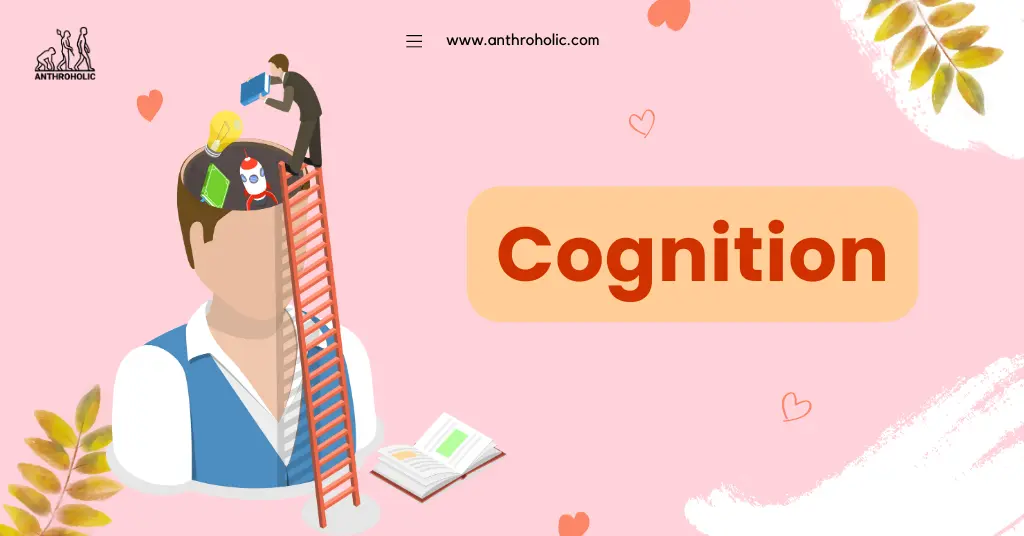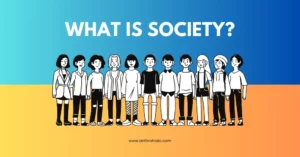AI Answer Evaluation Platform Live Now. Try Free Answer Evaluation Now
Cognition
Cognition is the suite of processes that lead to acquisition and understanding of knowledge. It involves several mental activities like learning, remembering, problem-solving, and perception. It is an essential aspect of our intelligence and conscious thought [1].

Different Elements of Cognition
Cognition is not a single, unified process. Instead, it is an umbrella term encompassing multiple mental processes [2]. Here are some key elements:
- Perception: It is our ability to interpret sensory information and make sense of our surroundings [3].
- Attention: This component involves focusing our mental resources on specific information while ignoring other stimuli.
- Memory: The capacity to retain and recall past experiences and information.
- Language: It is a tool used to communicate thoughts and understand others’ ideas.
- Problem-solving: This cognitive process helps us navigate obstacles and achieve our goals.
Cognitive Development Stages
Jean Piaget, a renowned psychologist, proposed four stages of cognitive development [4]:
- Sensorimotor Stage (Birth to 2 years): Infants gain knowledge through sensory experiences and manipulating objects.
- Preoperational Stage (2 to 7 years): Children start to develop imagination and use symbols to represent objects.
- Concrete Operational Stage (7 to 11 years): Children begin to think logically about concrete events.
- Formal Operational Stage (12 years and up): Adolescents develop abstract and logical thought processes.
Cognitive Disorders
Impairments in cognitive processes lead to cognitive disorders. Here are three main types [5]:
- Neurocognitive Disorders: These disorders (e.g., Alzheimer’s disease, Dementia) involve decline in cognitive function beyond what’s expected from normal aging.
- Learning Disorders: These are problems with cognitive processes related to learning, including dyslexia and ADHD.
- Psychotic Disorders: Conditions like schizophrenia involve distorted thought processes.
Methods of Studying Cognition
Understanding cognition involves studying various processes. Some commonly used methods include:
- Neuropsychological Tests: These assess different cognitive functions, such as memory and language skills.
- Brain Imaging Techniques: Methods like fMRI and PET scans help to visualize the brain’s active regions during different cognitive tasks.
- Cognitive Psychology Experiments: These are designed to test various cognitive theories.
Cognitive Enhancement
Improving cognitive function is a popular area of interest. Techniques often suggested include:
- Physical Activity: Regular exercise has been linked with better cognitive performance, particularly memory and attention [6].
- Healthy Diet: Nutrient-rich foods can support brain health and cognition.
- Mental Training and Games: Engaging in mentally stimulating activities may improve various cognitive functions.
- Mindfulness and Meditation: These practices can help enhance attention and cognitive flexibility.
Cognitive Theories
Understanding cognition is often facilitated by cognitive theories. These frameworks help explain how we acquire, process, and use information. Here are three influential theories:
- Information Processing Theory: This theory likens the human mind to a computer, suggesting that information flows through a series of processing steps, including encoding, storage, and retrieval [7].
- Social Cognitive Theory: Developed by Albert Bandura, this theory emphasizes the importance of observational learning, self-efficacy, and social influence [8].
- Multiple Intelligences Theory: Howard Gardner’s theory proposes that individuals possess multiple independent intelligences, such as linguistic, logical-mathematical, and spatial, which they use to solve problems and navigate the world [9].
Factors Influencing Cognition
Cognition can be affected by several factors, including:
- Age: Cognitive abilities can change as we age, with some abilities peaking in young adulthood and others remaining stable throughout life.
- Health: Physical health conditions, like heart disease, and mental health conditions, such as depression, can influence cognitive function [10].
- Education: Higher levels of education have been associated with better cognitive function [11].
- Environment: Exposure to environmental toxins or stressors can negatively impact cognition.
Importance of Cognition in Everyday Life
Cognition plays a vital role in nearly every aspect of our daily lives:
- Decision Making: Cognitive processes help us evaluate options and make informed decisions.
- Communication: Understanding, interpreting, and responding to verbal and nonverbal cues are cognitive processes.
- Learning: Whether in academic settings or in everyday life, cognition is central to our ability to learn and acquire new knowledge.
Future Research in Cognition
The field of cognition continues to evolve as new technologies, such as machine learning and advanced neuroimaging, become increasingly sophisticated. Future research may help elucidate the neural basis of cognition, the impact of genetics on cognitive abilities, and the potential for cognitive enhancement through pharmacological interventions.
Conclusion
Cognition is a complex, intricate process central to our ability to interact with the world. Understanding this process opens the door to treatments for cognitive disorders, strategies for cognitive enhancement, and, ultimately, a deeper understanding of the human mind.
References
[1] Sternberg, R. J. (2012). Cognitive Psychology. Wadsworth Cengage Learning.
[2] Goldstein, E. B. (2015). Cognitive Psychology: Connecting Mind, Research, and Everyday Experience. Nelson Education.
[3] Schiffman, H. R. (2001). Sensation and Perception: An Integrated Approach. John Wiley & Sons.
[4] Piaget, J. (1972). The psychology of the child. Basic Books.
[5] American Psychiatric Association. (2013). Diagnostic and statistical manual of mental disorders (DSM-5®). American Psychiatric Publishing.
[6] Hillman, C. H., Erickson, K. I., & Kramer, A. F. (2008). Be smart, exercise your heart: exercise effects on brain and cognition. Nature Reviews Neuroscience, 9(1), 58-65.
[7] Atkinson, R. C., & Shiffrin, R. M. (1968). Human memory: A proposed system and its control processes. The psychology of learning and motivation, 2, 89-195.
[8] Bandura, A. (1986). Social foundations of thought and action: A social cognitive theory. Prentice-Hall, Inc.
[9] Gardner, H. (1983). Frames of mind: The theory of multiple intelligences. Basic Books.
[10] Yaffe, K., Falvey, C. M., & Hoang, T. (2014). Connections between sleep and cognition in older adults. The Lancet Neurology, 13(10), 1017-1028.
[11] Stern, Y. (2002). What is cognitive reserve? Theory and research application of the reserve concept. Journal of the International Neuropsychological Society, 8(3), 448-460.




